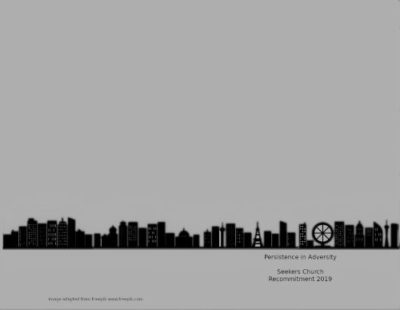Sermons
Seekers recognizes that any member of the community may be called upon by God to give us the Word, and thus we have an open pulpit with a different preacher each week. Sermons preached at Seekers, as well as sermons preached by Seekers at other churches or events, are posted here, beginning with the most recent.
Click here for an archive of our sermons.
Feel free to use what is helpful from these sermons. We only ask that when substantial portions are abstracted or used in a written work, please credit Seekers Church and the author, and cite the URL.
.wp-show-posts-columns#wpsp-4136 {margin-left: -2em; }.wp-show-posts-columns#wpsp-4136 .wp-show-posts-inner {margin: 0 0 2em 2em; }
“What is Written on Your Heart?” by Deborah Sokolove
 October 20, 2019
October 20, 2019
Recommitment Sunday for Church of the Saviour Communities
The Nineteenth Sunday after Pentecost
I often preach during the recommitment season. As a follower of Jesus Christ and a member of a 12 Step fellowship, I recommit to turn my life and will over to God pretty much every day—indeed, sometimes multiple times every day. But I don’t think as often about my commitment to Seekers Church, so this season is an opportunity to reflect on what I am committing to as a member and a Steward in this community.
This is an important day in the life of this body, so when I signed up to preach today, I had not bothered to look at the readings because I knew it was Recommitment Sunday and that was what mattered. So I nearly laughed out loud when I finally did open the lectionary and discovered that the selections were like a giant wink from God. In the Gospel passage, Jesus tells a story about a person whose faithfulness in her pursuit of justice can be a model for us all. While that is pertinent, if you want to know what I’ve been thinking about the widow and the corrupt judge, you can read today’s Inward/Outward. This morning at Seekers, I’m going to talk about the Jeremiah passage, which talks about God’s renewed covenant with the Israelites.
“A Recommitment to Seekers, God, and Mother Earth” by John Morris
 October 13, 2019
October 13, 2019
The Eighteenth Sunday after Pentecost
This is the final week before Recommitment Sunday. I never have any trouble deciding whether to recommit to Seekers. Seekers is my spiritual home, my extended family, and I think you’d have to look far and wide to find a church that does as much good, with as little nonsense, as Seekers does. Moreover, I still feel the way I did when I first showed up here: The percentage of people I like at Seekers is amazingly high. I can only hope they like me too.
Amen.
Well, if that’s all I had to say to you, it wouldn’t be much of a sermon, though it would be short, which is always welcome.
Sorry, though, I do have a few more things to say.
“To Do What is Ours To Do” by Marjory Zoet Bankson
 October 6, 2019
October 6, 2019
The Seventeenth Sunday after Pentecost
Now that you’ve heard from David Lloyd and Jacqie Wallen during this season of recommitment, you know that Learners & Teachers Mission Group sees the School for Christian Growth as an integral part of the commitment process at Seekers. Next week, you will hear the final offering from our mission group by John Morris. I look forward to hearing his take on recommitment too.
I had not checked the lectionary when I signed up for this week, nor had I checked the calendar when I told Doug Dodge that I would be glad to throw a few pots on my potter’s wheel to attract visitors to the Seekers booth at the Takoma Park Street Fair today. But for me, those things feel pretty normal for life at Seekers, complex and a bit demanding, – and that’s why I’ve been recommitting here, year after year. I want to be moving toward healing and wholeness, and to share my life with others who take Jesus seriously.
A Service in the Style of Taizé for the season of Recommitment 2019
 September 29, 2019
September 29, 2019
The Sixteenth Sunday after Pentecost
“Being a Wise Steward” by Jacqie Wallen
 September 22, 2019
September 22, 2019
The Fifteenth Sunday after Pentecost
I am a member of the Learners and Teachers Mission Group. Members of this Mission Group traditionally offer sermons during recommitment season, the time leading up to Recommitment Sunday. During this time, we Seekers are all asked to review our commitment to God and to Seekers Church. Some key questions that we are advised to ask ourselves are:
- What am I being called to offer to God and God’s creation?
- How can being a part of Seekers Church support my response to God’s call?
- What do I need from and through this community in order to deepen my commitment to Christ?
When Learners and Teachers divided among ourselves the available dates for preaching, I ended up with what is arguably the most difficult to understand of Jesus’s parables — The Shrewd Manager, The Dishonest Steward, or The Unjust Steward, as it is variously called. I tried to switch to a different date but the other dates were all taken. I was stuck with it. In this parable, a rich man seems to be praising an employee who he has fired for mismanaging his accounts. He praises the manager even though the manager has shortchanged him by collecting reduced amounts from the rich man’s debtors in order to ensure their good will in the future. The rich man says: “And I tell you, make friends for yourselves by means of dishonest wealth so that when it is gone, they may welcome you into the eternal homes.”
What??